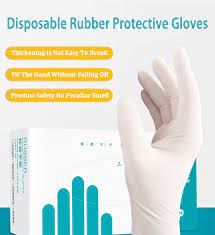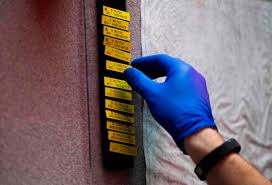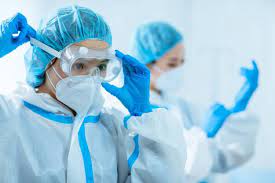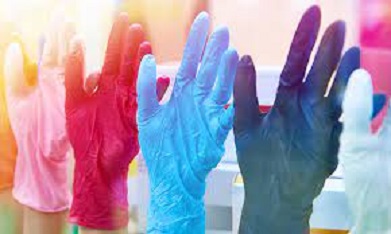When you’re working in a lab, hospital, or any other setting where there is a risk of bacteria exposure, it’s important to take precautions to avoid cross-contamination. One of the simplest and most effective ways to do this is by using single-use gloves. These gloves are designed for one-time use only, and they can help keep your hands and the environment safe from harmful bacteria.
Table of Contents
- Main Cases When We Need To Use Single-Use Gloves
- Other Situations When You Should To Wear Single-Use Gloves
- Workers Who Need To Use Single-Use Gloves
- About Legal Requirements To Wear Single-Use Gloves
- Is it a legal requirement to wear gloves when handling food?
- OSHA Standarts for wearing Single-Use Gloves for healthcare workers
- OSHA Standarts for wearing Single-Use Gloves for laboratory workers
- In Conclusion
Single-Use Gloves protect protect both yourself and other people from bacteria. If you are handling food, for example, you are less likely to contaminate the food if you are wearing gloves. Wearing gloves also protects the person who will be eating the food from any bacteria that might be on your hands.
Main Cases When We Need To Use Single-Use Gloves
Disposable gloves are a wonderful resource for individuals who require sanitary protection. Wearing gloves, for example, helps to minimize germ transmission and assure cleanliness for medical experts.
You’ll need Disposable gloves if:
- You need a sanitary barrier
- You need an impermeable barrier
- You need chemical protection
- You need biohazard protection
- You need to avoid cross-contamination
- You need protection and dexterity at the same time
If you are handling hazardous materials, you must wear gloves to protect yourself from exposure. This includes chemicals, cleaning products, and anything else that might be harmful if it comes into contact with your skin.

Other Situatuions When You Should To Wear Single-Use Gloves
If you have any cuts, scrapes, or burns on your hand, you also should to wear a single-use gloves. This will protect you from infection and also prevent you from contaminating any surfaces that you touch.
You should also wear gloves when you are cleaning up after someone who is sick. This will protect you from any bacteria or viruses that they might have. It is also a good idea to wear gloves when you are doing laundry for someone who is sick. This will prevent the spread of the illness to other people in your household.
In general, it is a good idea to use single-use gloves whenever there is a risk of cross-contamination. This includes situations where you are handling food, cleaning, or working with hazardous materials. Wearing gloves will protect you from bacteria and viruses, and it will also protect the people around you.

So there you have it! These are just a few of the many situations where single-use gloves are required for health and safety. If you find yourself in any of these situations, be sure to put on a pair of gloves to protect yourself and others.
Workers Who Need To Use Single-Use Gloves
There are many other situations where single-use gloves are required for health and safety. Workers who need bacteria protection:
- healthcare workers
- laboratory workers
- food workers, etc.
If you are a healthcare worker, you will need to wear gloves when you are caring for patients. This is because there is a risk of cross-contamination between patients and healthcare workers. Single-use gloves protect both the patient and the healthcare worker from infection.
If you work in a laboratory, you will also need to wear gloves. This is because there is a risk of exposure to dangerous chemicals. Wearing gloves protects you from these chemicals and also prevents you from contaminating the samples that you are working with.
All food workers are required to wear gloves when handling food. This includes cooks, servers, and dishwashers. Wearing gloves prevents the spread of bacteria from the hands to the food. It also protects the person who is eating the food from any bacteria that might be on the hands of the food worker.
About Legal Requirements To Wear To Use Single-Use Gloves
Is it a legal requirement to wear gloves when handling food?

There is no federal law that requires people to wear gloves when handling food. However, many states have their own laws that mandate the use of gloves in certain situations. For example, California requires food workers to wear gloves when they are handling raw meat, poultry, and fish.
OSHA Standarts for wearing Single-Use Gloves for healthcare workers
In accordance with the Office of Occupational Safety and Health (official website), namely, the OSHA standard, section 1910.1030 (d) (3), defines performance-based requirements for personal protective equipment transmitted through blood. As a result, it is the employer’s duty to assess the tasks and kinds of exposure expected at his or her workplace and, based on that analysis, choose the “appropriate” personal protective equipment in accordance with paragraph 1910.1030(d)(3)(i) of the regulation.

Gloves must be worn whenever there is a good possibility of employee hand contact with blood, other potentially infectious material (OPIM), mucous membranes, or non-intact skin. Please keep in mind that the term “contaminated” refers to the presence of blood or other potentially infectious materials rather than simply being “visibly” soiled when using this definition.
Disposable gloves must be changed as soon as feasible when contaminated or torn, and as soon as possible if they are punctured. These norms protect the worker from illness risks posed by bloodborne pathogens. OSHA does not require that gloves be changed between patients if they are not contaminated and their barrier function has not been affected. Changing gloves between patients, according to the preamble of the regulation, is a good infection control practice to reduce patient-to-patient transmission of disease. Furthermore, employees who have contact with filthy linen or trash must also wear protective gloves that should be changed when soiled.
OSHA Standarts for wearing Single-Use Gloves for laboratory workers
OSHA has regulatory requirements for diagnostic laboratories that include administrative and work practice controls, as well as the use of barrier protection (such as gloves) whenever employees’ jobs may result in contact with biological organisms. Employers must first determine whether such work is potentially hazardous, and then put in place the necessary controls to safeguard workers under OSHA’s standards.

So there you have it! These are just a few of the many situations where single-use gloves are required for health and safety. If you find yourself in any of these situations, be sure to put on a pair of gloves to protect yourself and others.
blog post content: Single-use gloves are required forhealth and safety in many different settings. If you workin healthcare or food service, handle hazardous materials,or are cleaning up after
In general, it is a good idea to check with your local health department to see if there are any laws in your state that require you to wear gloves. Even if there is not a law mandating the use of gloves, it is still a good idea to wear them whenever possible to protect yourself and others from bacteria and viruses.
In Conclusion
Single-use gloves are required for health and safety in many different situations. They protect both the person wearing them and the people around them from bacteria and other hazards. Next time you need to wear gloves, make sure that you choose single-use gloves to protect yourself and others. Choose single-use gloves whenever possible to keep yourself and those around you safe from harm. Thanks for reading! I hope this has been informative:)
